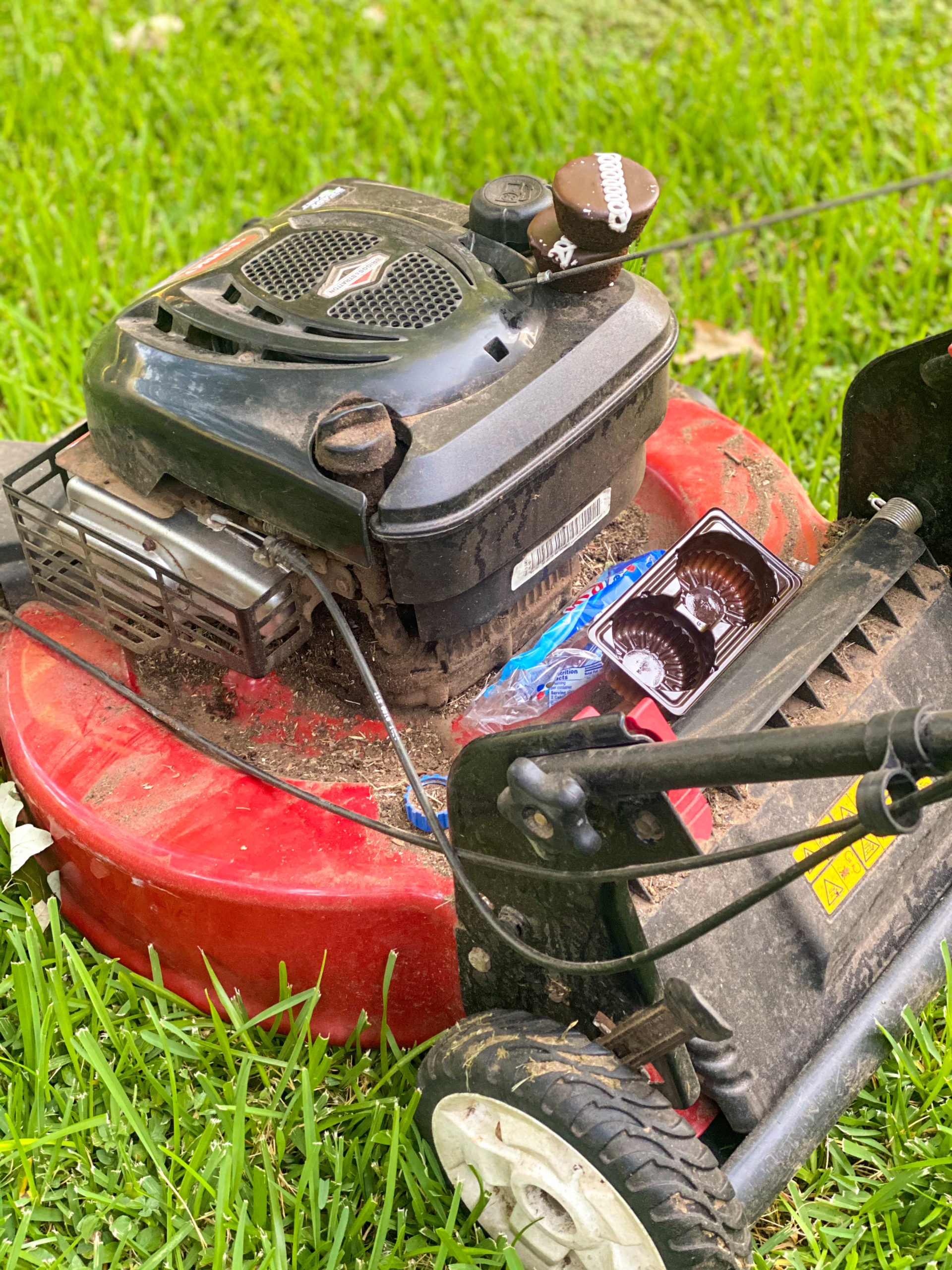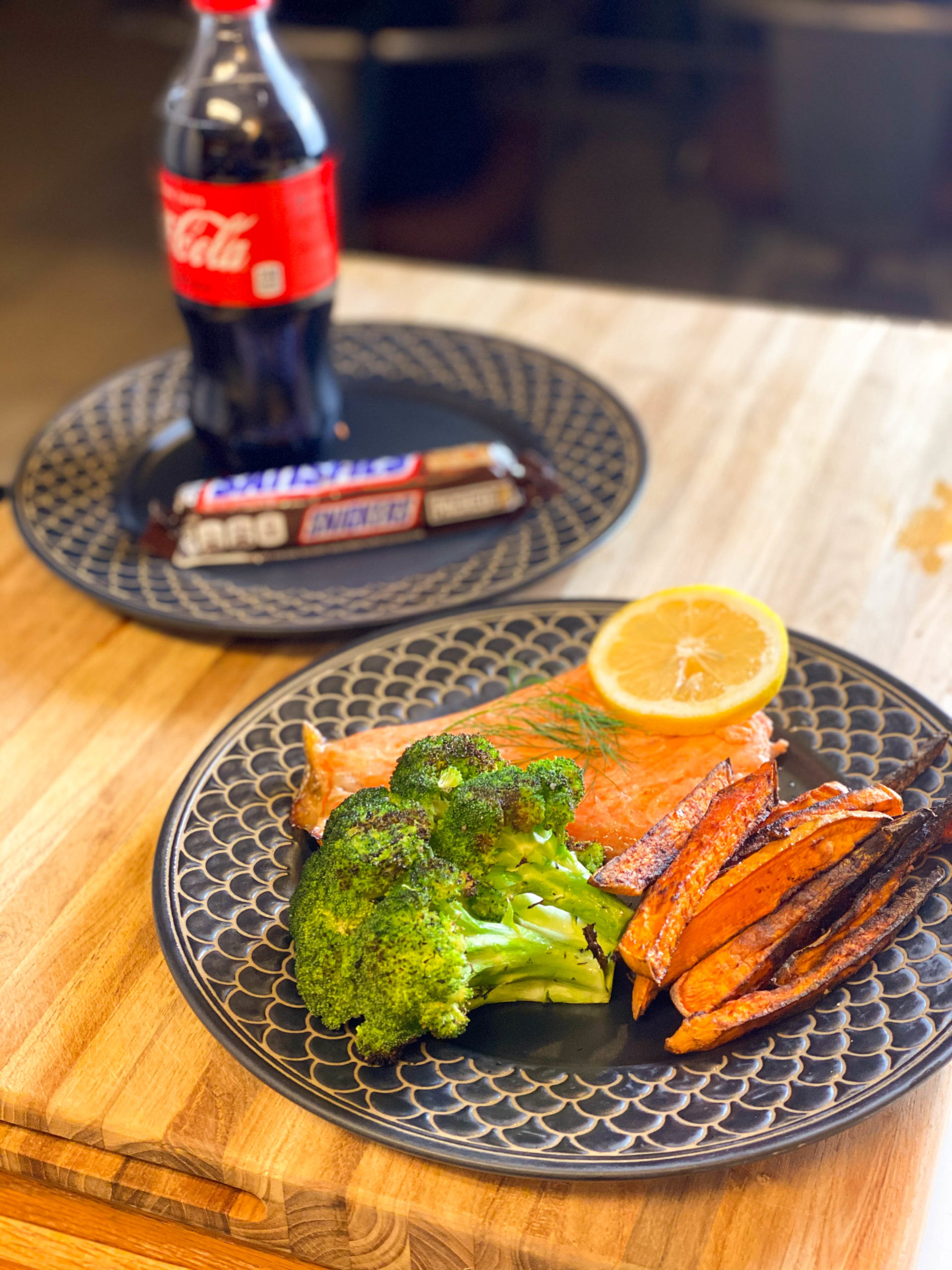
Primal Gift
Imagine hearing your neighbor cussing loudly at his lawnmower. When you walk over to see if he needs help he’s cranking away on the starter rope but the mower isn’t offering any encouraging sounds of starting.
That’s when you notice the empty cupcake wrappers. You chalk it up to questionable breakfast choices or maybe he needed a snack to sustain his losing battle with his mower.
He finally concedes defeat and says that he’ll never try to use cupcakes instead of gas in his mower again.
You’d probably start worrying about your neighbor. Everyone knows that if it’s not electric, lawnmowers run on gasoline not cupcakes.
I know it’s a ridiculous story but I was thinking about how tough fuel choices can be when things aren’t as cut and dried as internal combustion engines.
We walk around in some pretty impressive machinery. Think about it. Cupcakes, carrots or carne guisada our body will run on damned near anything.
Before I go any further, let me say upfront that I’m not a doctor or a nutritionist. So, I’m not in the medical advice business and if you’re under a doctor’s care by all means follow his/her instructions.
I am a certified Primal Health coach and my goal is to help people to understand how to tap in to, what I’m calling, our Primal Gift.
Here’s what I mean by Primal Gift. A lot of blood, sweat and tears went in to making us the durable, resilient beasts that we are today. And we didn’t have to do any of the heavy lifting. Our distant ancestors were hunter-gatherers who evolved over about a 2 ½ million-year period.
Civilization and agriculture burst on the scene about 10-12,000 years ago but by then our genetic blueprint was already pretty sorted out. For all practical purposes we’re hunter-gatherers with air conditioning.
Here’s the Primal Gift part. We didn’t have to endure the food scarcity or the getting chased or mauled by wild animals. Instead, we just inherited the results of the natural selection that our distant ancestors endured.
Innately we’re resilient, resourceful and naturally robust and healthy. But that gift comes with a kicker. To take full advantage of this impressive predisposition we need to operate a little closer to the manufacturer’s specs.
Remember that food scarcity part that I talked about – it’s important. Surviving scarcity is one of the reasons that we’re so food flexible, but that flexibility has a downside.
Primal us couldn’t drop by the grocery store and pick up a few things on the way home from work and they couldn’t order a pizza. Sometimes they were successful in their hunting and gathering and sometimes they struck out. And when winter rolled around food availability got even tougher.
So, think what a survival advantage you’d have if you could store surplus food, when it was available, as body fat that you could burn when your arrow missed the mark and your dinner ran away or the plants that you normally ate were buried under a foot of snow.
Putting on a few pounds during times of plenty kept you from starving to death during times of scarcity. But keep in mind there was always a shortage around the next corner so the pounds never hung around for long.
So, the good news is that we’re wired to be resilient, strong, agile and robust and we won’t starve to death if we miss a few meals. We’re not, however, optimized for non-stop abundance and we sure aren’t equipped for a Taco Swell Crunchwrap Extravaganza or a 48 oz Mega Gulp.
It’s why I cringe whenever I see the standard “everything in moderation” eating recommendation.
It’s not that it’s factually wrong, it’s just overly simplistic and I think it sets people up to fail.
The advantage of using evolution as a lens isn’t to convince people to start living in caves and eating bugs and lizards. It’s to help people avoid some of the mismatch problems between our metabolic predisposition and our current environment.
Forgive me for another fuel/food analogy. If the pump at the gas station is working correctly you don’t have to worry about flooding the area around your car with gasoline if you get distracted when you’re filling your car with gas. Gas pumps have some type of technical magic that senses when your gas tank is nearly full and it shuts off the pump before you overflow the tank.
Wouldn’t it be great if we had something similar? Some type of biological magic that would tell us that we’ve eaten enough. It would be wild if we had some type of on-board computer that would let us know before we overfill our tanks. Turns out we do. It’s called satiety but it’s not fool proof.
Have you ever gone out for pizza and you have a solid game plan going in. You’re going to eat a piece of pizza, maybe two and call it a night. Four slices later and you’re just getting warmed up. Plus, you threw a couple of beers in to keep it interesting.
Three pieces of Pizza Hut supreme pizza has 1200 calories. That’s the same number of calories as a cooked 34 oz grass-fed sirloin.
Unless you’re Joey Chestnut or one of his competitive eating buddies you’re going to have to work at it to eat almost 3 pounds of sirloin. But 3 pieces of pizza is pretty pedestrian. And there’s always room for dessert.
So, what’s the deal? How can 1200 calories of steak seem like a mountain of food and 1200 calories of pizza seem like no big deal?
When it comes to satiety, and even more importantly nutrient density, not all calories are equal.
Lays Potato Chips had a famous TV ad – “Bet you can’t eat just one.” They knew damn good and well that you couldn’t eat just one because they understood something about appetite control and how to manipulate it.
We now have teams of food scientists whose job is to make food that’s irresistible. There’s even a name for it, it’s called hyperpalatable food. It literally lights up the pleasure centers in your brain like an opiate or cocaine.
I’m not sure that those folks encouraging a diet of “all things in moderation” would put opium and cocaine into that bucket.
Trying to eat less of something that has an army of people dedicated to overcoming your willpower is like taking a knife to a gun fight.
Here’s a suggestion. For the next month, just eat real food.
“Surely,” you say, “it’s more complicated than that.” Nope. That’s actually the perfect place to start.
Plants and animals. Meat, fish and eggs are extremely nutrient dense foods and they provide enormous satiety so they’re difficult to over eat. Fill the rest of your plate up with vegetables. And no, I’m not talking about corn and macaroni and cheese. I mean real vegetables. Green beans, asparagus, broccoli, collard greens, spinach, mushrooms, get adventurous and try something that you’ve never cooked before. Even add a little sweet potato or new potato.
Here’s what I’d ask you to avoid. No industrial seed oils like canola oil, vegetable oil, corn oil, soy bean oil. Corn oil isn’t like olive oil, where you press olives and get olive oil. Corn oil goes through a heavy lift to become corn oil and in the process the oil becomes damaged and oxidized. It’s sort of like building a deck with wood that’s already starting to rot. Not a great strategy.
I primarily use avocado oil and extra virgin olive oil (EVOO). I’ll use coconut oil and even lard for some things, but mainly avocado and EVOO.
The other thing that I’d recommend is for 30 days is to skip all grains. That will freak some folks out, but it doesn’t have to be forever. I just think it’s useful to see how you feel without them.
Focusing on whole foods does something else. It gets rid of added sugar. And that’s a big deal. I’m not saying that you can’t use chicken broth if it has sugar in it, but pretty quickly you realize that they put sugar in a lot of things. It’s part of the irresistible formula again.
If you want something sweet have some fruit and if you can handle dairy you can put some fruit in some full fat, unsweetened yogurt. Or have some fruit and some cheese.
And for vegetarians and vegans I understand that the meat and fish recommendations won’t fly, but I’d still suggest ditching the sugar and avoiding processed foods and seed oils.
People are cooking now more than ever, so this is the perfect time to take the challenge.
It’s also a great time to understand the power of this metabolic gift that has been with us since the day we were born and to do a better job of cultivating it. Eating delicious, real food is a lot better deal than having to eat bugs or getting mauled by a bear. Leverage that gift on your road to better health.
Enjoy!
And if you need help with your journey please check out these resources or my coaching program.


This Post Has 0 Comments